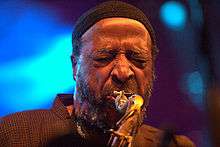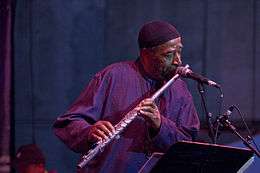Yusef Lateef
Yusef Abdul Lateef (born William Emanuel Huddleston; October 9, 1920 – December 23, 2013) was an American jazz multi-instrumentalist, composer, and prominent figure among the Ahmadiyya Community in America.
Yusef Lateef | |
|---|---|
 Lateef in a 2007 performance | |
| Background information | |
| Birth name | William Emanuel Huddleston |
| Also known as | Yusef Lateef |
| Born | October 9, 1920 Chattanooga, Tennessee, U.S. |
| Died | December 23, 2013 (aged 93) Shutesbury, Massachusetts |
| Genres | New-age, jazz, post-bop, jazz fusion, swing, hard bop, third stream, world music |
| Occupation(s) | Musician, composer, educator, spokesman, author |
| Instruments | Tenor saxophone, flute, oboe, bassoon, bamboo flute, shehnai, shofar, arghul, koto, piano, vocals. |
| Years active | 1955–2013 |
| Labels | Savoy, Prestige, Verve, Riverside, Impulse, Atlantic, CTI, YAL |
| Associated acts | Cannonball Adderley |
| Website | yuseflateef |
Although Lateef's main instruments were the tenor saxophone and flute, he also played oboe and bassoon, both rare in jazz, and also used a number of non-western instruments such as the bamboo flute, shanai, shofar, xun, arghul and koto. He is known for having been an innovator in the blending of jazz with "Eastern" music.[1] Peter Keepnews, in his New York Times obituary of Lateef, wrote that the musician "played world music before world music had a name".[2]
Lateef wrote and published a number of books including two novellas entitled A Night in the Garden of Love and Another Avenue, the short story collections Spheres and Rain Shapes, also his autobiography, The Gentle Giant, written in collaboration with Herb Boyd.[3] Along with his record label YAL Records, Lateef owned Fana Music, a music publishing company. Lateef published his own work through Fana, which includes Yusef Lateef's Flute Book of the Blues and many of his own orchestral compositions.
Biography
Early life and career
Lateef was born in Chattanooga, Tennessee. His family moved, in 1923, to Lorain, Ohio, and again in 1925, to Detroit, Michigan, where his father changed the family's name to "Evans".[4]
Throughout his early life Lateef came into contact with many Detroit-based jazz musicians who went on to gain prominence, including vibraphonist Milt Jackson, bassist Paul Chambers, drummer Elvin Jones and guitarist Kenny Burrell. Lateef was a proficient saxophonist by the time of his graduation from high school at the age of 18, when he launched his professional career and began touring with a number of swing bands. The first instrument he bought was an alto saxophone but after a year he switched to the tenor saxophone, influenced by the playing of Lester Young.[5]
In 1949, he was invited by Dizzy Gillespie to tour with his orchestra. In 1950, Lateef returned to Detroit and began his studies in composition and flute at Wayne State University.
It was during this period that he converted to Islam as a member of the Ahmadiyya Muslim Community[6] and changed his name.[7] He twice made the pilgrimage to Mecca.[8]
Prominence
Lateef began recording as a leader in 1957 for Savoy Records, a non-exclusive association which continued until 1959; the earliest of Lateef's album's for the Prestige subsidiary New Jazz overlap with them. Musicians such as Wilbur Harden (trumpet, flugelhorn), bassist Herman Wright, drummer Frank Gant, and pianist Hugh Lawson were among his collaborators during this period.
By 1961, with the recording of Into Something and Eastern Sounds, Lateef's dominant presence within a group context had emerged. His "Eastern" influences are clearly audible in all of these recordings, with spots for instruments like the rahab, shanai, arghul, koto and a collection of Chinese wooden flutes and bells along with his tenor and flute. Even his use of the western oboe sounds exotic in this context; it is not a standard jazz instrument. Indeed, the tunes themselves are a mixture of jazz standards, blues and film music usually performed with a piano/bass/drums rhythm section in support. Lateef made numerous contributions to other people's albums including his time as a member of saxophonist Cannonball Adderley's Quintet during 1962–64.
In the late 1960s he began to incorporate contemporary soul and gospel phrasing into his music, still with a strong blues underlay, on albums such as Detroit and Hush'n'Thunder. Lateef expressed a dislike of the terms "jazz" and "jazz musician" as musical generalizations.[9] As is so often the case with such generalizations, the use of these terms do understate the breadth of his sound. For example, in the 1980s, Lateef experimented with new-age and spiritual elements.
In 1960, Lateef again returned to school, studying flute at the Manhattan School of Music in New York City. He received a bachelor's degree in music in 1969 and a master's degree in music education in 1970. Starting in 1971, he taught courses in "autophysiopsychic music" at the Manhattan School of Music, and he became an associate professor at the Borough of Manhattan Community College in 1972.
In 1975, Lateef completed his dissertation on Western and Islamic education and earned an Ed.D. in education from the University of Massachusetts Amherst. In the early 1980s, Lateef was a senior research fellow at the Center for Nigerian Cultural Studies at Ahmadu Bello University in the city of Zaria, Nigeria. Returning to the US in 1986, he took a joint teaching position at the University of Massachusetts Amherst and Hampshire College.
Later career

His 1987 album Yusef Lateef's Little Symphony won the Grammy Award for Best New Age Album.[10][7] His core influences, however, were clearly rooted in jazz, and in his own words: "My music is jazz."[11]
In 1992, Lateef founded YAL Records. In 1993, Lateef was commissioned by the WDR Radio Orchestra Cologne to compose The African American Epic Suite, a four-part work for orchestra and quartet based on themes of slavery and disfranchisement in the United States. The piece has since been performed by the Atlanta Symphony Orchestra and the Detroit Symphony Orchestra.
In 2005, Nicolas Humbert & Werner Penzel, directors of Step Across The Border, filmed Brother Yusef, in his wooden house in the middle of a forest in Massachusetts. In 2010 he received the lifetime Jazz Master Fellowship Award from the National Endowment for the Arts (NEA), an independent federal agency.[7][12] Established in 1982, the National Endowment for the Arts Jazz Masters award is the highest honor given in jazz.[13]
The Manhattan School of Music, where Lateef had earned a bachelor's and a master's degree, awarded Lateef its Distinguished Alumni Award in 2012.
Lateef's last albums were recorded for Adam Rudolph's "Meta Records". To the end of his life, he continued to teach at the University of Massachusetts Amherst and Hampshire College in western Massachusetts. Lateef died on the morning of December 23, 2013, at the age of 93, survived by his son, Yusef Lateef and his wife, Ayesha Lateef.[14]
Following his death, Lateef's family auctioned off many of his instruments, in the hopes that they would continue to be played. Woodwind player Jeff Coffin purchased Lateef's main tenor saxophone as well as his bass flute.
On June 25, 2019, The New York Times Magazine listed Yusef Lateef among hundreds of artists whose material was reportedly destroyed in the 2008 Universal fire.[15]
Discography
Personal life
Lateef said what he remembered most about his childhood was "My passion for nature."[16]
In 1980, Lateef declared that he would no longer perform any place where alcohol was served. In 1999 he said “Too much blood, sweat and tears have been spilled creating this music to play it where people are smoking, drinking and talking."[2]
Lateef's first wife, Tahira, died before him, as did a son and a daughter. He was survived by his wife, Ayesha; a son, Yusef; a granddaughter; and several great-grandchildren.[2]
References
- Farberman, Brad, "Lateef, Yusef Abdul (William Evans)", Encyclopedia of Jazz Musicians – Archived December 23, 2012, at the Wayback Machine. Retrieved April 6, 2013.
- Keepnews, Peter (December 24, 2013). "Yusef Lateef, Innovative Jazz Saxophonist and Flutist, Dies at 93". The New York Times.
- Smith, E. "Doc" (October 22, 2010). "Yusef Lateef Comes to Grace Cathedral". BeyondChron. Retrieved November 11, 2010.
- Atkins, Ronald (December 30, 2013), "Yusef Lateef obituary", The Guardian.
- Marquard, Bryan (December 27, 2013), "Dr. Yusef Lateef, 93; UMass professor embraced world music", The Boston Globe.
- "About Yusef Lateef". Yuseflateef.com. FANA Music/YAL Records. Archived from the original on September 1, 2012. Retrieved December 5, 2012.
- "About Yusef Lateef". Official website. 2013. Retrieved June 11, 2013.
- "Yusef Lateef – obituary", The Telegraph, December 27, 2013.
- Heckman, Don (December 24, 2013), "Yusef Lateef dies at 93; Grammy winner blended jazz, world music", Los Angeles Times.
- "Black Turn Grammys Into A Show Biz Extravaganza". Jet. March 21, 1988. Retrieved November 11, 2010.
- Jung, Fred, "A Fireside Chat With Yusef Lateef", Jazz Weekly.
- "Lifetime Honors: 2010 NEA Jazz Master – Yusef Lateef". National Endowment for the Arts Jazz Masters. Archived from the original on September 27, 2011. Retrieved November 10, 2010.
- "Lifetime Honors: NEA Jazz Masters 1982-2011". National Endowment for the Arts Jazz Masters. Archived from the original on September 27, 2011. Retrieved November 10, 2010.
- "Yusef Lateef, Grammy-winning musician, composer, dies at 93", Gazettenet.com, December 23, 2013.
- Rosen, Jody (June 25, 2019). "Here Are Hundreds More Artists Whose Tapes Were Destroyed in the UMG Fire". The New York Times. Retrieved June 28, 2019.
- "Interview: Yusef Lateef (Part 1) - JazzWax". Jazzwax.com.
External links
| Wikimedia Commons has media related to Yusef Lateef. |
- Official site
- Radio Interview with Yusef Lateef
- Yusef Lateef on IMDb
- Yusef Lateef at AllMusic
- "NEA Jazz Masters: Interview with Yusef Lateef". Lateef being interviewed by A. B. Spellman on behalf of the National Endowment for the Arts, October 21, 2009.